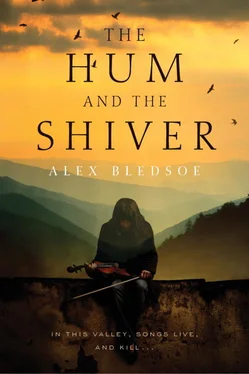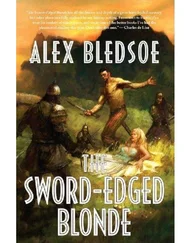“No, it’s this Sunday. If anyone shows up, I’ll be surprised.”
“Reaching the Tufa has defeated many a young zealot, I reckon,” Landers agreed. “I knew a man who’d once been a top vinyl siding salesman before hearing the call. His first post was in Needsville itself, if you can imagine that. Not only did no one show up, he couldn’t keep his piano in tune. For some reason that aggravated him more than anything else. He asked for a post in China soon after.”
“That’s a big reason I wanted to meet with you,” Craig said. “I’ve been spending time in town, just hanging out and introducing myself, offering any help I can. Everyone’s friendly enough, but I can’t imagine any of them in a pew on Sunday morning.” He sipped his coffee. “What do you know about them that I don’t?”
“They’re quiet, keep to themselves,” George deadpanned.
“I already know that. But why don’t they come to church?”
“Why doesn’t anyone? We’re not relevant to them.”
“Are the Tufas even Christian?”
Landers shrugged. “Son, greater men than you or I have puzzled over that. The real Tufas, the ones with family ties back to pre-Revolutionary times, won’t talk. The ones that do talk, don’t know anything. So it’s a tough little nut.”
Craig recalled Deacon Hyatt’s comments. “They must believe in something.”
“Sure, they do: music. I’ve never met one yet that didn’t sing or play some kind of instrument. And play the heck out of it, too. If they ever wanted to, about half of ’em could probably move to Nashville and be on everyone’s iPods within six months.”
“Why don’t they?”
“Some do. Ever heard of Rockhouse Hicks?”
“Sure, he sits outside the post office every day. I’ve met rabid skunks who were friendlier.”
“That’s him. Well, back in the late sixties, he almost made it as a big bluegrass star. Put out a record, traveled with Bill Monroe, was right on the edge. Then he got caught in a sex scandal, and that was that.”
Craig didn’t hide his surprise. “A sex scandal? That’s a little hard to picture.”
“He’s just a man,” Landers said. “Prey to the same temptations as us all. But my point is, that tends to happen to any of the real Tufas who leave their little valley. Look at your latest celebrity, Bronwyn Hyatt.”
“Being hurt in a war is a little different from having trouble keeping your pants zipped.”
“Maybe. But both happened away from Needsville.”
The waitress refreshed their coffee. “So they play music, and they fare badly when they leave home. That still doesn’t help me get them to church.”
“No. But in six months when you get moved to another position, you’ll at least understand a little about why this didn’t work.”
“That’s pretty fatalistic for a minister.”
“Oh, don’t get me wrong, if God wants them in church, they’ll go to church. I believe that, and apparently so does the annual conference, because they keep sending new ministers until they find one who can reach these people.”
“Do you believe God wants them in church?”
Landers looked around, then leaned over the table and spoke softly. “Here’s what I think, and if you repeat it, I’ll deny it. I believe God wants everyone in church, but I’m not entirely sure our God and their God are the same thing.”
“There’s a school of thought that would call that blasphemy.”
“And they’d be right, but there it is. We also have noses that run and feet that smell. Sometimes the universe just doesn’t make sense.”
* * *
Don Swayback pulled his car to the side of the road beneath an oak tree. The sporadic shade made the sunlight dance on his dusty windshield. He picked up the road atlas and compared it to the Internet maps he’d printed out at home. Both agreed; so where the hell was the turnoff?
Ahead he saw the intersection of Highway 23 and Curly Mane Road. A tractor reached it and slowly pulled onto the highway, headed away from Don. Far behind him, though still visible in the mirror, was the turnoff for Jenkins Trail. And in between should have been the road that dead-ended at the Hyatt farm, called simply Hyatt Way. But he’d been up and down this stretch of blacktop a dozen times without finding it.
He thumped the steering wheel in annoyance. He’d always heard the Tufa could disappear when they wanted to, although he assumed that meant they vanished right before your eyes, which of course was impossible. It was typical of the stories that grew up around small, isolated places, and that white folks tended to spread about any group with darker skin. But he supposed that being impossible to find was the same as disappearing.
He jumped when an unmistakable electronic shriek sounded right behind his car. In the rearview mirror he saw the state trooper’s cruiser; in the side mirror, he watched the trooper emerge and swagger toward him. The officer took his time, planting each large foot flat and square so every step sounded like approaching retribution.
When the trooper reached the driver’s open window, Don looked up and saw his own reflection in the mirrored shades. “Sir, are you having car trouble?” the trooper asked, in a tone that seemed more suited to a Guantánamo guard.
“No, I’m looking for—”
The square face, with its huge flat-brimmed hat, leaned down. The name tag on his chest caught the light, and Don saw the word PAFFORD. “I asked you a yes-or-no question, not for your life story. If you’re having car trouble, I’ll call you a tow truck and make sure you get to a garage. If not, I expect to find you gone when I come back by here. Understand me?”
Don blinked in surprise. “I was just going to ask for some help with directions. I’m trying to find the turnoff for—”
Pafford smiled. Don suspected it was for the benefit of the trooper’s dashboard video camera, because his voice was a snarl of contempt. “Get smart with me, son, and I’ll shove a Taser so far up your ass, your nose will light up like Rudolph’s. I ran your license plate; I know you’re one of them reporters making a big deal out of Bronwyn Hyatt. Around here she ain’t no hero, she’s just white trash from the hills who ended up in the wrong place at the wrong time. You makin’ over her just means every other half-nigger Tufa will think they can smart off to the law and get away with it.”
Don stared. He’d encountered all sorts of cops in his job, but never one so brazen in his prejudices. “Officer,” he said carefully, “I don’t believe I’m breaking any laws sitting here. I’m certainly not bothering anyone.”
“You’re bothering me. And if you look up and down this highway, you’ll see that’s the worst thing you could be doing, because ain’t nobody gonna come help you out. Now git before I lose my good nature, and you lose an awful lot of time and money to the Great State of Tennessee.”
Don’s hands shook as he turned the key and pulled slowly out onto the highway. The trooper stood watching, hip cocked, one hand on his gun. Don wanted to turn around and go back the way he came, but instead drove straight, forty miles out of his way, to make sure he didn’t have to pass the trooper again.
By the time he hit the junction to Highway B near the interstate, his anger had truly peaked. He thought of calling Sam at the Horn and getting a lawyer involved, but he had no proof of anything. After all, the trooper let him off with a warning, and the dashboard camera would show nothing out of line.
“Fuck,” he snarled. He was as angry as he’d ever been, just like he used to get as a young man. But this was no frat-house bully, he reminded himself. This was a cop, who could beat him senseless—or kill him—and get away with it.
Читать дальше












